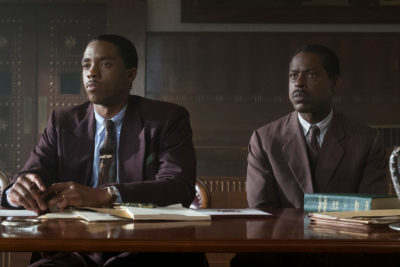
Most biographical dramas are dry, fact-driven and stereotypical. To many in the audience, it is just a repetition of historical textbook chapters translated onto the screen.
Another catch: these films tend to be very pushy. They intend to provide viewers with something upon which they can reflect, a moral lesson or some sort — yet they manage to shove the whole point into the viewers’ faces in the most unnatural ways.
Remarkably, “Marshall” defies the odds.
The film revolves around the 1941 court case, The State of Connecticut v. Joseph Spell, in which a black chauffeur Joseph Spell (Sterling K. Brown) is accused of raping and attempting to murder socialite white woman Eleanor Strubing (Kate Hudson) of elite class.
Tasked by the NAACP, Thurgood Marshall (Chadwick Boseman) teams up with a local Connecticut insurance lawyer Sam Friedman (Josh Gad) to defend Spell from what is seemingly a false accusation created because of the race.
What makes the film so unique and exceptional is what the story focuses on.
The court case itself is relatively unknown, even if it did serve as the beginning of Thurgood Marshall’s legacy. People will often associate Marshall with the ground-breaking case of Brown v. Board of Education rather than this one.
The director of the film, Reginald Hudlin, could have gone with a movie that dedicated its time to that specific case. However, he did not.
By focusing on a virtually nameless case, “Marshall” adds a sense of mystery — a mystery that no one knows what the outcome of the case would be.
This, in turn, makes “Marshall” more of a crime thriller drama, rather than the monotonous biographical films that many tend to stay away from. It grabs the audience and does not let go until the very last moment when the credits start rolling.
The actors’ portrayal of these characters does not fall short of the expectations, either. Boseman presents a charming, humorous Marshall that very few knew existed underneath the hero that championed for black rights. Similarly, Gad portrays the man conflicted between what’s ethical and the safety for himself and his family.
Hudson and Brown give the audience two sides of what the case was about — a case for a black man and a case for a woman — and something for the viewers to sympathize with for each side.
Then there are the elite northerners — notably Loren Willis (Dan Stevens) and Judge Foster (James Cromwell) — who represent the opposite side, reminding the audience that racism comes in all sizes and shapes. As scenes progress by, the subtle hints of racism turn into jabs, which then evolves into blatant xenophobic attacks.
The film sheds light on the places where the audience thinks is safe from racism — the hard truth that “Marshall” tells is a no.
“Marshall” is not a black-or-white movie; it doesn’t give the audience the morality of the story straight up. The film is complicated, deep and fleshed out. It does not have to rely on excess details or dramas to smack the audience in the face with the lesson of the story.
Instead, it makes the viewers think on the legacy of this small court case on the history of the United States. It makes them realize the impact of Marshall’s work on others.
“Marshall” ultimately raises the question of what it means to stand up for something. And it feels eerily similar to current events.
On Sunday, Vice President Mike Pence walked out a National League Football game when several players knelt during the national anthem to protest racial injustice. President Donald Trump applauded Pence while criticizing the NFL to change its policy on the demonstrations caused by the football players.
It seems naught what Marshall had done for the people of the color. Countless advocates and leaders walked miles, spent nights in prisons and challenged the authorities in the past to make sure that the future generations would not suffer from the pains of injustice of their time.
Yet we are still making the same mistakes. That is why movies like “Marshall” are needed everywhere and all the time. The film reminds that it can be something even simple — it is just about standing up for something.




